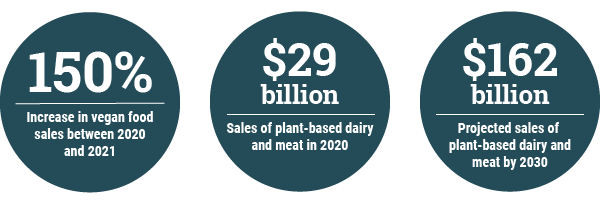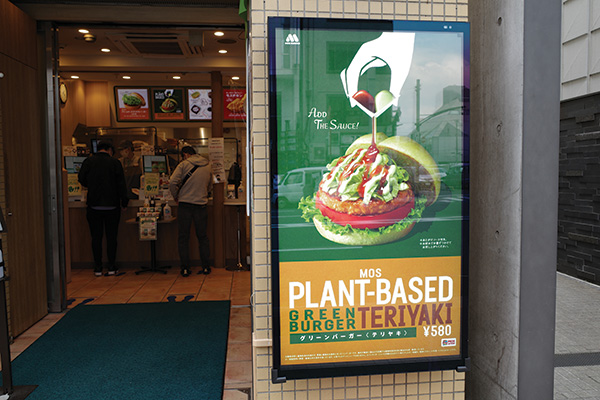
Veganism is defined as a lifestyle that endeavors to exclude all forms of exploitation of and cruelty to animals for clothing, food or any other purpose. With respect to diet, the term refers to the practice of abstaining from eating all animal produce. This includes meat, fish, poultry, eggs, animal milks, honey and all their derivatives.
Based in Palm Beach Gardens, Florida, BeVeg has developed and implemented an international vegan certification program. Encompassing everything from food ingredients to the products used to clean food processing equipment and the food-grade lubricants that keep that equipment in working order, the certification program aims to bring “legal credibility to vegan claims, which inherently raises the standard of consumer transparency, bringing integrity to a process that was once legally deficient,” the company’s website said.
The company was founded in 2017 and is currently working to gain its third year of accreditation under ISO 17065 and ISO 17067. It is the creator and standard owner of the only accredited, audit-based standard in the world to date.
The technical administrator of BeVeg’s vegan certification is NSF, which is a global, independent organization dedicated to protecting and improving human health. According to the organization’s website, the NSF certification mark “assures consumers, retailers and regulators that certified products have been rigorously tested to comply with all standard requirements.” Among the many products that NSF certifies are food-grade lubricants.

“We have a very robust auditor training program,” said Carissa Kranz, founder and CEO of BeVeg. “We have a serious checklist that was built with GSFI standards and GMP practices in mind. The BeVeg standard has GFSI and GRMA and GMP as prerequisites to the vegan standard. So it requires a serious third party technical administrator to be able to administer the standard with integrity. BeVeg is only interested in partnering with certification bodies that have the ability and the expertise to carry out a vegan claim with integrity that would warrant against our standard. NSF has the infrastructure, the training, the auditors and the ability to do all of that.”
Sara Risley, director of product certification for NSF, agreed. “NSF, from a food safety perspective, is a leading global provider, so it really made a lot of sense for us to partner with BeVeg, given our client base and our expertise in the realm of auditing and food safety. For lubricants, it’s really relevant. Not only can we do the registration and that type of work, but we can also really lend our expertise for the customers that [BeVeg is] trying to attract. If they’re looking for vegan lubricants to use in their food manufacturing facility, this is a great way to pair those two worlds together.”
Why Is a Vegan Standard Necessary?
“I’m a vegan from birth,” Kranz said. “I’m also a lawyer, and thought I was always vegan. It wasn’t until much later in life that I was having a tofu burrito with a friend of mine and I ordered a glass of wine. She told me that my wine may have been filtered through a fish bladder. I was pretty disgusted, and I didn’t believe her. Then I turned to Google, and sure enough I started learning about things that can go on in the manufacturing process of making wine.”
|
“I started to realize that while the consumer protection laws are in place for other label claims to prevent misleading and fraudulent claims, they somehow fell short when it came to vegan.”
– Carissa Kranz, BeVeg |
Kranz explained that this realization then opened her eyes to other products that claimed to be vegan but may have fallen short of the mark in reality. “That opened the door to other food products and cosmetics,” she explained. “As a lawyer, my antennas went off, and I started realizing that there’s a big problem here. There’s a lack of definition; it’s the Wild West. People are using vegan claims freely. There’s no consistent standard, there’s no audit checklist, there are no manufacturing facility controls in place, and everyone is self-claiming vegan. I started to realize that while the consumer protection laws are in place for other label claims to prevent misleading and fraudulent claims, they somehow fell short when it came to vegan.”
So why has a vegan standard been lagging behind other similar standards?
It is only in recent years that veganism has become a widely adopted lifestyle. “I don’t think that consumer protection laws mean to fall short, but I do think the time is now for us to define it,” Kranz said. “It was very taboo to be vegan when I was young, but now it’s mainstream. Now plant-based products are very popular, and the consumer—whether they’re the super consumer or not—doesn’t deserve to be lied to. They deserve transparency. BeVeg offers that.”
That said, the main advantage of a clearly defined vegan standard “is that it really fills the gray areas where the laws fall short right now globally,” Kranz said.
The Basics of the BeVeg Standard
At its core, “the BeVeg standard is a process-based standard,” Kranz said. “So it’s a quality assurance standard that basically requires facility audits and facility standard operating procedures to be in place to ensure no cross-contamination of the final product that would be BeVeg certified.”
She continued: “The BeVeg program is a facility audit standard. We certify facilities, and facilities must cooperate for products to then gain access to the trademark after. It’s not required that the facility be a dedicated vegan facility because most facilities are shared and have shared lines. But what is required is that there is a senior-level commitment in the standard operating procedures to show that there is going to be no animal cross-contamination and that integrity and quality assurance are going to be maintained in the manufacturing process.”
How do food-grade lubricants play into the standard and its associated facility audit?
Simply stated, the standard takes into account every product that does or could possibly come into contact with the final certified product. “We look into every ingredient, we look into every supplier ingredient, and we want to make sure that there’s no animal exploitation in any part of the process,” Kranz said. “That includes animal testing as well. So if a lubricant is used in a final certified product or if the lubricant is the final certified product, it’s going to be looked at in terms of whether there is any deliberate or intentional additive of any animal DNA or not. Is there any chance of cross-contamination that would be incidental and accidental in the process? That would be considered before granting certification.”
Additionally, once a product is certified by BeVeg, the trademarked certification mark can be displayed on the label of the product.
Advantages for Lubricant Marketers
Knowledge of the expanding demand for vegan food as well as what it takes to obtain BeVeg’s vegan certification can help lubricant marketers to assist their customers in meeting the standard.
“People really look at vegan food in a couple of different ways,” NSF’s Risley said. “Obviously, there are those people who are very committed to veganism from a moral standpoint but also those who might have food allergies. They’re allergic to dairy or they’re allergic to eggs, so they’re looking at those vegan products not just from a moral perspective. I really feel like it’s a great thing for a lubricant manufacturer to understand that the category of people who are buying vegan food is growing, and the way consumers are looking at how they want to buy food will help [lubricant producers] to support the businesses—the food manufacturers—that they are trying to sell to.”

Furthermore, “The work that we do at NSF touches all industries,” Risley said. “My team specifically really looks at claims that people are making that bring value. What we see with those—for example, if you’re a lubricant manufacturer that is selling a product to a food manufacturer, or you’re selling an end product that’s going to end up on a shelf at a grocery story—it’s really important from the very beginning of the supply chain to the very end of the supply chain to ensure consistency. There’s a huge demand from the companies downstream in that supply chain—the people that maybe a lubricant manufacturer is going to target. They’re able to really differentiate their products because they have these additional claims that make it easier for the food manufacturer to check that the food-grade lubricant is also vegan” and can be used to make truly vegan products that meet BeVeg’s standard.
Kranz added that the BeVeg standard can help to keep the supply chain accountable. “There are a lot of products that may use an ingredient supplier, and if that ingredient supplier is certified by BeVeg, then it’s easier to sell to manufacturers of these other end products that might want to use your products,” she said.
Other Benefits
BeVeg’s standard provides not only economic benefits to those brands that have obtained certification, but it also provides a certain degree of legal protection.
“BeVeg is a program that has to do with risk assessment,” Kranz said. “So when, as a lawyer, I started connecting the dots, I realized how a vegan program is needed to protect not only the consumer to get what they think they are buying, which is plant-based products, but it also protects the retailer to ensure the manufacturing facilities did their due diligence. Then it protects the manufacturing facilities and the brand owners because they did their due diligence, too. Product recalls may or may not still happen, but when they do happen, you’re a lot less negligent when you’ve gone through an audit and had certain protocols and standard operating procedures in place to ensure no contamination. Plus, it’s just a way to avoid an expensive product recall.”
Furthermore, adhering to the standard also decreases the likelihood that animal-derived allergens are present in the final product. “A lot of people will choose a vegan product because they expect it to mean that it’s free from animal material” Kranz said. “More than half of the world’s most potent allergens are from animal origin, so it’s very important to have a vegan standard that is not confused with allergen alibi disclosure warnings. It should be vegan—even if it’s made in a shared facility with eggs and dairy—and it should not contain animal material if it went through audit protocols and had standard operating procedures in place” during production.
Constant Evolution
BeVeg’s vegan certification standard has been crafted in such a way that will allow it to evolve as necessary. “BeVeg has built a standard that is very robust,” Kranz said. “It’s more than 130 pages and goes into clear technical definitions and audit processes and protocols. It is a living, breathing document that allows us to constantly update and republish based on things we learn in the auditing process. This allows us to be consistent in our application globally of a vegan trademark that actually means something.”
Sydney Moore is managing editor of Lubes’n’Greases magazine. Contact her at Sydney@LubesnGreases.com